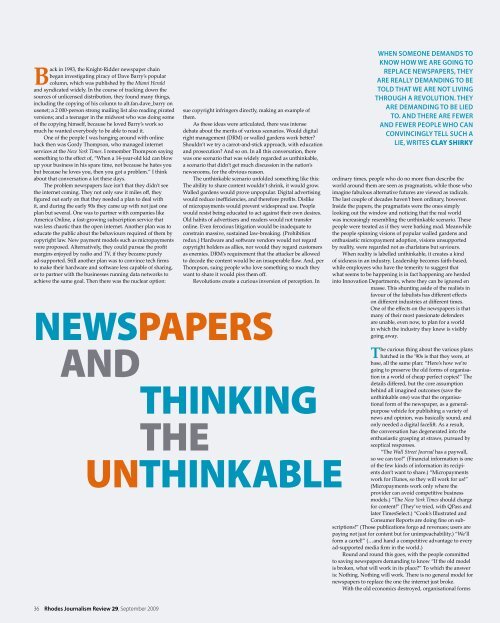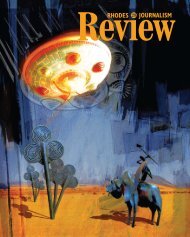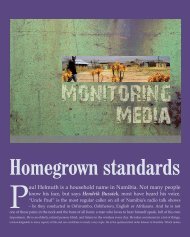Riding on the cup: - Rhodes Journalism Review - Rhodes University
Riding on the cup: - Rhodes Journalism Review - Rhodes University
Riding on the cup: - Rhodes Journalism Review - Rhodes University
Create successful ePaper yourself
Turn your PDF publications into a flip-book with our unique Google optimized e-Paper software.
Back in 1993, <strong>the</strong> Knight-Ridder newspaper chain<br />
began investigating piracy of Dave Barry’s popular<br />
column, which was published by <strong>the</strong> Miami Herald<br />
and syndicated widely. In <strong>the</strong> course of tracking down <strong>the</strong><br />
sources of unlicensed distributi<strong>on</strong>, <strong>the</strong>y found many things,<br />
including <strong>the</strong> copying of his column to alt.fan.dave_barry <strong>on</strong><br />
usenet; a 2 000-pers<strong>on</strong> str<strong>on</strong>g mailing list also reading pirated<br />
versi<strong>on</strong>s; and a teenager in <strong>the</strong> midwest who was doing some<br />
of <strong>the</strong> copying himself, because he loved Barry’s work so<br />
much he wanted everybody to be able to read it.<br />
One of <strong>the</strong> people I was hanging around with <strong>on</strong>line<br />
back <strong>the</strong>n was Gordy Thomps<strong>on</strong>, who managed internet<br />
services at <strong>the</strong> New York Times. I remember Thomps<strong>on</strong> saying<br />
something to <strong>the</strong> effect of, “When a 14-year-old kid can blow<br />
up your business in his spare time, not because he hates you<br />
but because he loves you, <strong>the</strong>n you got a problem.” I think<br />
about that c<strong>on</strong>versati<strong>on</strong> a lot <strong>the</strong>se days.<br />
The problem newspapers face isn’t that <strong>the</strong>y didn’t see<br />
<strong>the</strong> internet coming. They not <strong>on</strong>ly saw it miles off, <strong>the</strong>y<br />
figured out early <strong>on</strong> that <strong>the</strong>y needed a plan to deal with<br />
it, and during <strong>the</strong> early 90s <strong>the</strong>y came up with not just <strong>on</strong>e<br />
plan but several. One was to partner with companies like<br />
America Online, a fast-growing subscripti<strong>on</strong> service that<br />
was less chaotic than <strong>the</strong> open internet. Ano<strong>the</strong>r plan was to<br />
educate <strong>the</strong> public about <strong>the</strong> behaviours required of <strong>the</strong>m by<br />
copyright law. New payment models such as micropayments<br />
were proposed. Alternatively, <strong>the</strong>y could pursue <strong>the</strong> profit<br />
margins enjoyed by radio and TV, if <strong>the</strong>y became purely<br />
ad-supported. Still ano<strong>the</strong>r plan was to c<strong>on</strong>vince tech firms<br />
to make <strong>the</strong>ir hardware and software less capable of sharing,<br />
or to partner with <strong>the</strong> businesses running data networks to<br />
achieve <strong>the</strong> same goal. Then <strong>the</strong>re was <strong>the</strong> nuclear opti<strong>on</strong>:<br />
36 <strong>Rhodes</strong> <strong>Journalism</strong> <strong>Review</strong> 29, september 2009<br />
sue copyright infringers directly, making an example of<br />
<strong>the</strong>m.<br />
As <strong>the</strong>se ideas were articulated, <strong>the</strong>re was intense<br />
debate about <strong>the</strong> merits of various scenarios. Would digital<br />
right management (DRM) or walled gardens work better?<br />
Shouldn’t we try a carrot-and-stick approach, with educati<strong>on</strong><br />
and prosecuti<strong>on</strong>? And so <strong>on</strong>. In all this c<strong>on</strong>versati<strong>on</strong>, <strong>the</strong>re<br />
was <strong>on</strong>e scenario that was widely regarded as unthinkable,<br />
a scenario that didn’t get much discussi<strong>on</strong> in <strong>the</strong> nati<strong>on</strong>’s<br />
newsrooms, for <strong>the</strong> obvious reas<strong>on</strong>.<br />
The unthinkable scenario unfolded something like this:<br />
The ability to share c<strong>on</strong>tent wouldn’t shrink, it would grow.<br />
Walled gardens would prove unpopular. Digital advertising<br />
would reduce inefficiencies, and <strong>the</strong>refore profits. Dislike<br />
of micropayments would prevent widespread use. People<br />
would resist being educated to act against <strong>the</strong>ir own desires.<br />
Old habits of advertisers and readers would not transfer<br />
<strong>on</strong>line. Even ferocious litigati<strong>on</strong> would be inadequate to<br />
c<strong>on</strong>strain massive, sustained law-breaking. (Prohibiti<strong>on</strong><br />
redux.) Hardware and software vendors would not regard<br />
copyright holders as allies, nor would <strong>the</strong>y regard customers<br />
as enemies. DRM’s requirement that <strong>the</strong> attacker be allowed<br />
to decode <strong>the</strong> c<strong>on</strong>tent would be an insuperable flaw. And, per<br />
Thomps<strong>on</strong>, suing people who love something so much <strong>the</strong>y<br />
want to share it would piss <strong>the</strong>m off.<br />
Revoluti<strong>on</strong>s create a curious inversi<strong>on</strong> of percepti<strong>on</strong>. In<br />
neWspapers<br />
and<br />
ThinkinG<br />
The<br />
UnThinkable<br />
WHEN SOmEONE DEmANDS TO<br />
kNOW HOW WE ARE gOINg TO<br />
REPlACE NEWSPAPERS, THEy<br />
ARE REAlly DEmANDINg TO BE<br />
TOlD THAT WE ARE NOT lIvINg<br />
THROUgH A REvOlUTION. THEy<br />
ARE DEmANDINg TO BE lIED<br />
TO. AND THERE ARE FEWER<br />
AND FEWER PEOPlE WHO CAN<br />
CONvINCINgly TEll SUCH A<br />
lIE, WRITES clay shirky<br />
ordinary times, people who do no more than describe <strong>the</strong><br />
world around <strong>the</strong>m are seen as pragmatists, while those who<br />
imagine fabulous alternative futures are viewed as radicals.<br />
The last couple of decades haven’t been ordinary, however.<br />
Inside <strong>the</strong> papers, <strong>the</strong> pragmatists were <strong>the</strong> <strong>on</strong>es simply<br />
looking out <strong>the</strong> window and noticing that <strong>the</strong> real world<br />
was increasingly resembling <strong>the</strong> unthinkable scenario. These<br />
people were treated as if <strong>the</strong>y were barking mad. Meanwhile<br />
<strong>the</strong> people spinning visi<strong>on</strong>s of popular walled gardens and<br />
enthusiastic micropayment adopti<strong>on</strong>, visi<strong>on</strong>s unsupported<br />
by reality, were regarded not as charlatans but saviours.<br />
When reality is labelled unthinkable, it creates a kind<br />
of sickness in an industry. Leadership becomes faith-based,<br />
while employees who have <strong>the</strong> temerity to suggest that<br />
what seems to be happening is in fact happening are herded<br />
into Innovati<strong>on</strong> Departments, where <strong>the</strong>y can be ignored en<br />
masse. This shunting aside of <strong>the</strong> realists in<br />
favour of <strong>the</strong> fabulists has different effects<br />
<strong>on</strong> different industries at different times.<br />
One of <strong>the</strong> effects <strong>on</strong> <strong>the</strong> newspapers is that<br />
many of <strong>the</strong>ir most passi<strong>on</strong>ate defenders<br />
are unable, even now, to plan for a world<br />
in which <strong>the</strong> industry <strong>the</strong>y knew is visibly<br />
going away.<br />
The curious thing about <strong>the</strong> various plans<br />
hatched in <strong>the</strong> ’90s is that <strong>the</strong>y were, at<br />
base, all <strong>the</strong> same plan: “Here’s how we’re<br />
going to preserve <strong>the</strong> old forms of organisati<strong>on</strong><br />
in a world of cheap perfect copies!” The<br />
details differed, but <strong>the</strong> core assumpti<strong>on</strong><br />
behind all imagined outcomes (save <strong>the</strong><br />
unthinkable <strong>on</strong>e) was that <strong>the</strong> organisati<strong>on</strong>al<br />
form of <strong>the</strong> newspaper, as a generalpurpose<br />
vehicle for publishing a variety of<br />
news and opini<strong>on</strong>, was basically sound, and<br />
<strong>on</strong>ly needed a digital facelift. As a result,<br />
<strong>the</strong> c<strong>on</strong>versati<strong>on</strong> has degenerated into <strong>the</strong><br />
enthusiastic grasping at straws, pursued by<br />
sceptical resp<strong>on</strong>ses.<br />
“The Wall Street Journal has a paywall,<br />
so we can too!” (Financial informati<strong>on</strong> is <strong>on</strong>e<br />
of <strong>the</strong> few kinds of informati<strong>on</strong> its recipients<br />
d<strong>on</strong>’t want to share.) “Micropayments<br />
work for iTunes, so <strong>the</strong>y will work for us!”<br />
(Micropayments work <strong>on</strong>ly where <strong>the</strong><br />
provider can avoid competitive business<br />
models.) “The New York Times should charge<br />
for c<strong>on</strong>tent!” (They’ve tried, with QPass and<br />
later TimesSelect.) “Cook’s Illustrated and<br />
C<strong>on</strong>sumer Reports are doing fine <strong>on</strong> subscripti<strong>on</strong>s!”<br />
(Those publicati<strong>on</strong>s forgo ad revenues; users are<br />
paying not just for c<strong>on</strong>tent but for unimpeachability.) “We’ll<br />
form a cartel!” (…and hand a competitive advantage to every<br />
ad-supported media firm in <strong>the</strong> world.)<br />
Round and round this goes, with <strong>the</strong> people committed<br />
to saving newspapers demanding to know “If <strong>the</strong> old model<br />
is broken, what will work in its place?” To which <strong>the</strong> answer<br />
is: Nothing. Nothing will work. There is no general model for<br />
newspapers to replace <strong>the</strong> <strong>on</strong>e <strong>the</strong> internet just broke.<br />
With <strong>the</strong> old ec<strong>on</strong>omics destroyed, organisati<strong>on</strong>al forms








